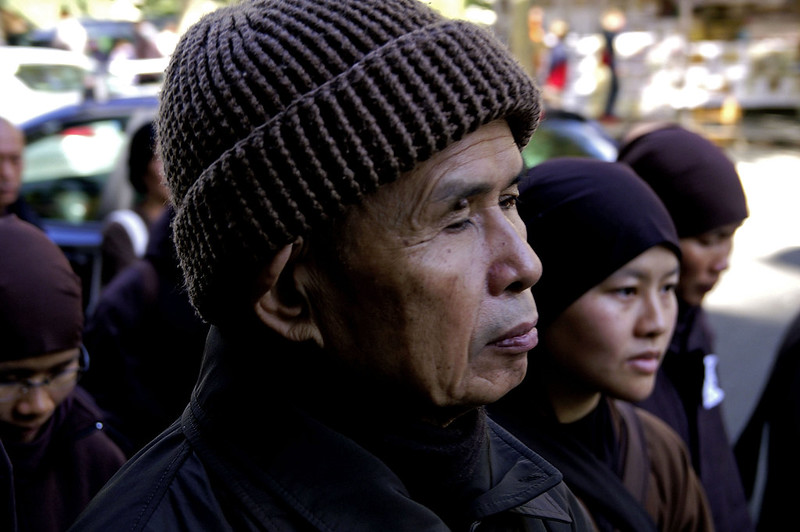Nothing is permanent, so everything is precious. Here’s a selection of some happenings—fleeting or otherwise—in the Buddhist world this week.
Vietnamese Zen Master Thich Nhat Hanh Passes Away
The beloved teacher, civil rights activist, and pioneer of engaged Buddhism died on January 22 at midnight (ICT) at his root temple, Tu Hieu Temple, in Hue, Vietnam. He was 95. Nhat Hanh suffered from a severe brain hemorrhage in 2014, which left him unable to speak, and had been living at Tu Hieu Temple. After the Plum Village Community, Nhat Hanh’s sangha, announced his passing, followers, dharma teachers, and world leaders, including the Dalai Lama, immediately started sharing remembrances and condolences. The Plum Village Community will host a second day of ceremonies, broadcast online, on January 22 at 8pm EST/5 pm PST. Find Memorial Practice Resources from Plum Village here and a worldwide schedule of memorial services here. Read Thich Nhat Hanh’s full obituary here.
The Rubin Museum of Art Returns Two Stolen Wooden Carvings to Nepal
In a growing movement to repatriate stolen art to its rightful home, the Rubin Museum of Art announced that it will return two wooden carvings that were smuggled from religious sites in Nepal just over 20 years ago. The museum cited the Nepal Heritage Recovery Campaign for its role in drawing attention to the theft of the carvings, one a 14th-century flying apsara, or female deity, stolen from Itum Bahal monastery, and the other a portion of a 17th century torana, or sacred gateway, taken from Yampi Mahabihara monastery. The Rubin will pay for the artifacts’ return, which will take place in May. In the past year, six pieces of artwork have been returned to Nepal. Read more about the decision here.
Meditation Teacher Brad Warner Leaves Angel City Zen Center, the Dharma Center He Founded in 2016
On Wednesday, writer and meditation teacher Daniel Scharpenburg wrote on Patheos that Brad Warner, founder of Angel City Zen Center, has quietly left the center. Warner mentioned his departure in passing on his website a few days earlier; his blog post is titled “So You Want to Be a Dharma Teacher.” Angel City Zen Center has not yet publicly mentioned Warner’s departure. Warner, the author of Hardcore Zen and Sit Down and Shut Up, was an early voice in the movement to call out sexual abuse and general abuse of power by Buddhist teachers, and, as Scharpenburgh says, he remains a loud, if polarizing, voice in the community.
Historic Trans Bhutan Trail Is Reopening After 60 Years
The Trans Bhutan Trail, a 250-mile historic pilgrimage trail that runs the length of the Buddhist kingdom, is set to reopen in March after being closed for 60 years. The Trail’s origins date back at least 500 years, when it connected fortresses and served as a pilgrimage route for Buddhists traveling to sacred sites in western Bhutan and Tibet. Although the Trail’s stairways and paths fell into disrepair in the 1960s, the Bhutan Canada Foundation, the King of Bhutan, and the Tourism Council of Bhutan began restoring the Trail in 2018 to make it accessible again for tourists, pilgrims, and locals. Beginning in March 2022, travelers will once again be able to access the 400 historic and cultural sites along the Trail.
The Paris Review Features an Illuminating Interview with Scholar and Author Charles Johnson — Free for This Week Only
On Tuesday, January 18, The Paris Review featured a 2018 interview with scholar, author, and Tricycle contributing editor Charles Johnson in front of its paywall, where it will remain for a week. Read the interview here.
Johnson—whose new graphic novel, The Eightfold Path, comes out this February— answered questions on his writing process, including whether he outlines (“In the beginning”) or keeps notebooks (“Oh yeah”); if he can describe the moment when he finds a character he wants to commit to (“Because I know I’ll have to live with it for a while—five years, six years, seven years—a novel has to have, at its core, a question so central that I’m going to keep returning to it because it’s very important as a question to me.”); and if he worries that characters might become “mouthpieces” for philosophical ideas (“I think ideas begin in the muck and mud of lived, daily experience. And for the purpose of reflection, we extract them so we can analyze them and talk about them. So when I write, I want to return the ideas to their original source within our experience.”). He also shared a central question on his mind at the time (“What is civility?”); and considered thornier questions like whether or not there are proprietary subjects in American literature. On the intersection of Buddhism and his philosophy studies, he said:
Well, let’s start with the fact that fuzzy-bunny Buddhism doesn’t often talk about what it’s all really about—that it’s a preparation for death. Buddhism begins with that young prince leading his sheltered life and seeing the four signs. He sees an old man, he sees a sick man, he sees a dead man, and he sees a holy man. And he realizes unequivocally, categorically, That’s me. I’m going to get old, I’m going to get sick, and I’m going to die. So how do I deal with this? Buddhism is about letting go of a lot of conceptual baggage, the stories we tell ourselves about ourselves—you let that go and there’s a sense of liberati.
Thank you for subscribing to Tricycle! As a nonprofit, we depend on readers like you to keep Buddhist teachings and practices widely available.
